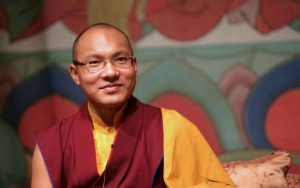
The Catholic Order of the Discalced Carmelites was founded in 1593 by two mystics, Saint Teresa of Avila and Saint John of the Cross. These figures of immense importance in late medieval Spain had set to reforming an earlier order that takes its name from the biblical Mount Carmel, Palestine and upholds the example of the Old Testament prophets and early Christian hermits.
In 1986, the Order founded the International Teresian-Sanjuanist Center (CITeS) in the Castilian city of Ávila, Saint Teresa’s birth town. It is a school with mysticism at its heart and is famous throughout the Catholic world as the highest academic exponent of Carmelite spirituality. The CITeS headquarters is an impressive star-shaped building with spacious, light-filled spaces and excellent learning facilities. CITeS is located within the medieval walled enclosure of Ávila, known as the city of stones and saints, which was declared a UNESCO World Heritage Site in 1985.
In collaboration with two Buddhist-oriented institutions, The Centre of Buddhist Studies (CBS) at the University of Hong Kong (HKU) and the Dharma-Gaia Foundation (FDG), the Catholic Order of the Discalced Carmelites and CITeS, are hosting the third inter-religious dialogue of its kind, titled “3rd World Meeting Teresian Mysticsm and Interreligious Dialogue.” This year’s interfaith dialogue, to take place on 25–26 July, is themed, “Tibetan Buddhism and Carmelite Spirituality: Guidelines for Visualizing, Contemplating and Finding the Sacred.”
CITeS has been active in promoting Buddhist-Christian dialogue for years. In 2016, CITeS announced its intent to conduct a series of meetings to establish a dialogue between Carmelite spirituality and the great traditions of Buddhism. The “1st World Meeting Teresian Mysticism and Interreligious Dialogue: Theravada Buddhism and Teresian Mysticism: Meditation and Contemplation, Paths to Peace” took place on 27–30 July 2017 in Ávila with many in attendance. The second congress intended for 22–26 July 2020, “Chan/Zen Buddhism and Carmelite spirituality: on Love and Compassion,” was canceled due to the pandemic, although the papers prepared for the congress will be published.
With global travel having reverted to normal, this third encounter is proud to be hosting at CITeS a delegation of scholars, monastics, and experts in Tibetan Buddhism from Austria, Bhutan, Germany, Greece, Hong Kong, India, and the United States. They travel to Ávila for four days of friendly dialogue and fraternal discussion: conversation without conversion, faiths seeking mutual understanding.
Among the speakers are some of the most recognized exponents of their respective traditions. The tradition of Tibetan Buddhism will be represented by renowned academics and experienced meditators. A meditation workshop will be conducted by a meditation master from India. A group of monks will recite sutras and chants each morning after the Christian Mass. On the Christian side, speakers will feature reputable Catholic academics and contemplatives.
The proposed theme for the meeting is to explore the role of revelation and visions in achieving wisdom (Skt. prajna), a critical concept in Buddhism and Christianity. In both the Carmelite tradition and Tibetan Buddhism, visualization, contemplation, and encounter with the ultimate are considered fundamental practices to foster spiritual growth and deepen the relationship with the sacred. Despite these traditions having different cultural, philosophical, and theological contexts, they share significant commonalities in their emphasis on the importance of prayer and contemplation as means to achieve union with the “ultimate,” be it with emptiness (Skt. shunyata) or God.
It is notable that while God does not equal emptiness, the experience of God in the Carmelite tradition is strikingly apophatic, and indicates a dissolution of the self. Both Carmelite and Buddhist mysticism seek the wordless, ineffable ultimate through different paths.
The first seeks self-knowledge and knowledge of Jesus Christ, which implies loving attention and a bond with the divine presence. For their part, Buddhists seek enlightenment through meditation and cultivation. Both forms of mysticism share the importance of discipline and contemplative and ritual practices, overcoming ego through a process of purification and enlightenment, the role of suffering as a means of spiritual growth, and the world as a manifestation of the divine.
The congress will be conducted in English and Spanish, with simultaneous interpretation. The meeting will also be live-streamed and recorded, and the proceedings will be published. Buddhistdoor Global and Buddhistdoor en Español will cover this special event comprehensively.
The purpose of the congress is to foster a mutual understanding of the convictions, practices, and religious objectives of believers and scholars of these two traditions. During four days of exchange, participants will have numerous possibilities for spiritual enrichment, learning about the beliefs and practices of both traditions, as well as exploring common affinities and differences in a spirit of union, integrity, and mutual respect. In this same spirit, we had the chance to briefly interview CBS director Dr. Georgios T. Halkias, a specialist in Vajrayana Buddhism in Tibet, Central Asia, and the Himalayas, to discuss this upcoming event.

Buddhistdoor en Español: What are your expectations for the upcoming Carmelite-Tibetan Buddhist Congress?
Georgios T. Halkias: The diverse traditions of Christianity and Buddhism have rich histories and philosophies. An academic encounter between the two conducted in the spirit of dialogue and openness could lead to increased mutual understanding and respect for the similarities and differences between these two profound religious traditions. Participants in such an encounter may gain new and transformative insights into their own religious beliefs, rituals, and contemplative practices. They may also wish to promote shared goals, such as social harmony, contemporaneous ethical values, and compassion in our world. It is a shared expectation that a significant academic contribution of the congress will appear in print to further promote the necessity of interfaith collaboration and dialogue and studies in comparative religion.
BDE: In your opinion, is there common ground between Christianity and Buddhism that can be explored during the congress?
GTH: Buddhism and Christianity are two sophisticated soteriological systems that emphasize the importance of compassion, forgiveness, the pursuit of peace, and the value of living a moral and ethical life. Christians and Buddhists are committed to alleviate suffering in the world and facilitate the view and circumstances for individual and collective spiritual development. There are also similarities in terms of the spiritual methods employed for leading a meaningful life enhanced by contemplation, worship, and prayer. These are some shared grounds we could explore with representatives from the Carmelite and Vajrayana traditions.
As on previous occasions, this third congress will feature presentations of papers, meditation workshops, rituals and chants, to name just a few of the many activities, all conducted in an atmosphere of conviviality and fraternity. Presentations from both sides on the topic will be followed by roundtable discussions led by a moderator knowledgeable in the subject matter in both traditions.

Once more, we will have the pleasure to visit our hosts in Ávila, a World Heritage city that is an hour by train from Madrid. Ávila has a rich cultural and architectural heritage, which is reflected in its old town. Jews, Muslims, and Christians coexisted here for centuries. Congress participants will be able to appreciate the context of the convention after touring the 2.5-kilometer medieval wall and visiting places such as the convent and museum of Saint Teresa. In addition, Ávila is close to other interesting destinations in Spain, such as the historic city of Toledo just a few kilometers away, as well as other major European cities.
Congress program and registration form
The “IV International Teresa of Jesús Award and Interreligious Dialogue” will be presented on the third day of the congress. CITeS created this award with private donations to expand the spiritual health of humanity and promote authentic interfaith dialogue. This third call focuses on comparative studies between Carmelite spirituality and other religious traditions, and the winner will receive a prize of €6,000. For the four finalists, the prize is €1,000 each. Award-winning works will be considered for inclusion in a special commemorative volume.
About the IV International Teresa of Jesús Prize and interreligious dialogue
See more
International Centre of Teresian and Sanjuanist Studies (CITeS)
The Centre of Buddhist Studies of the University of Hong Kong CBS (HKU)
Fundación Dharma-Gaia












